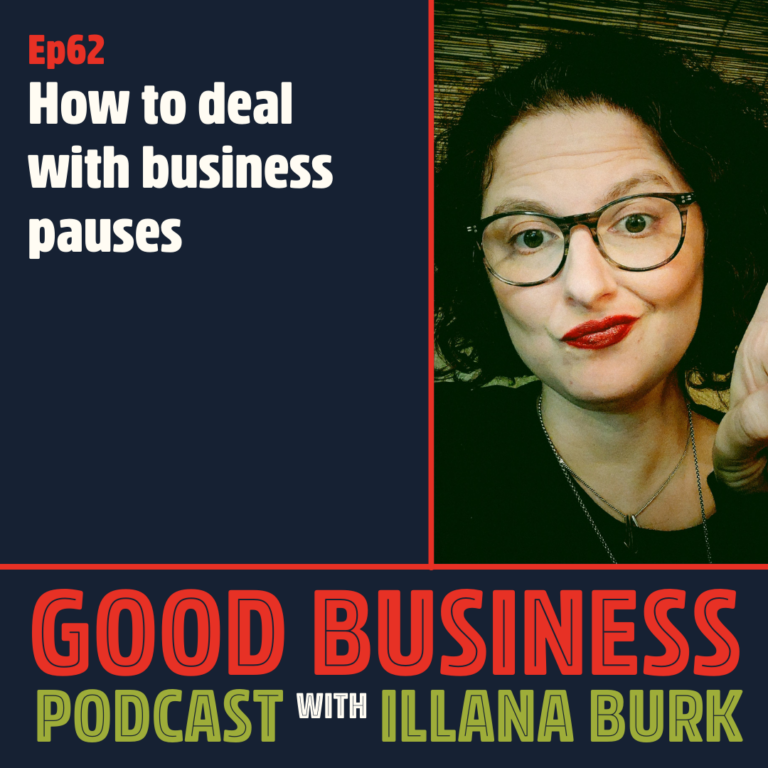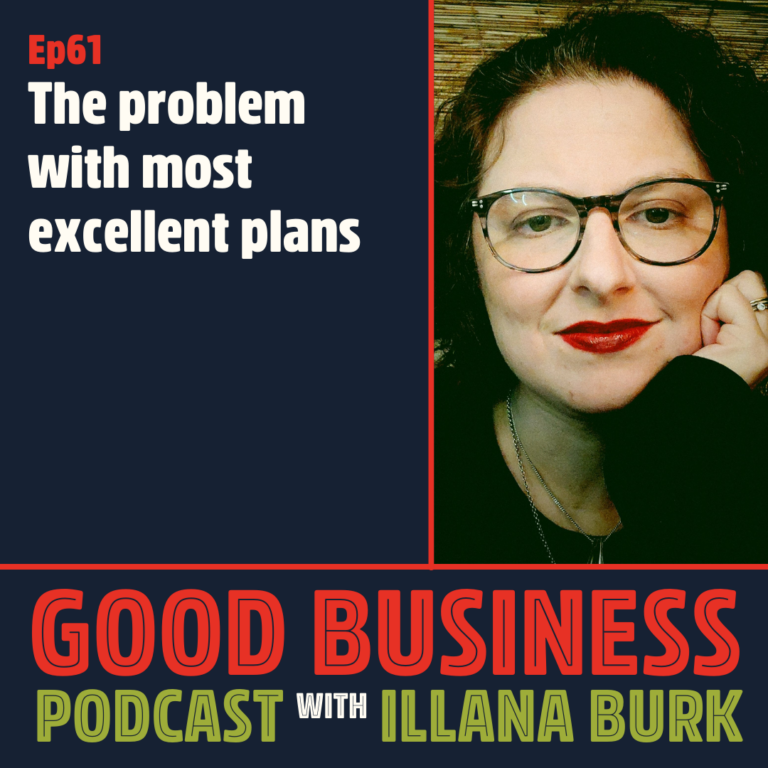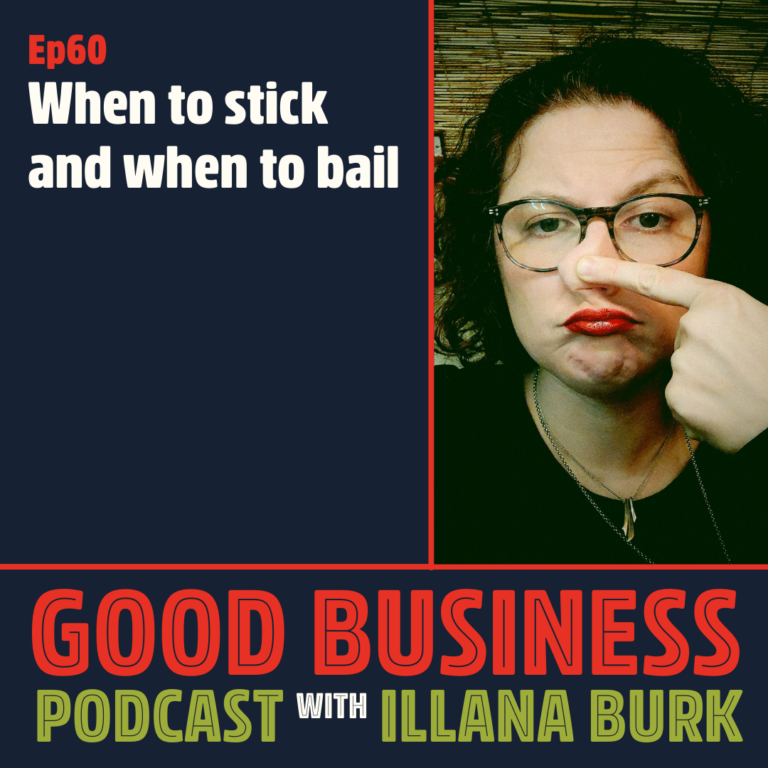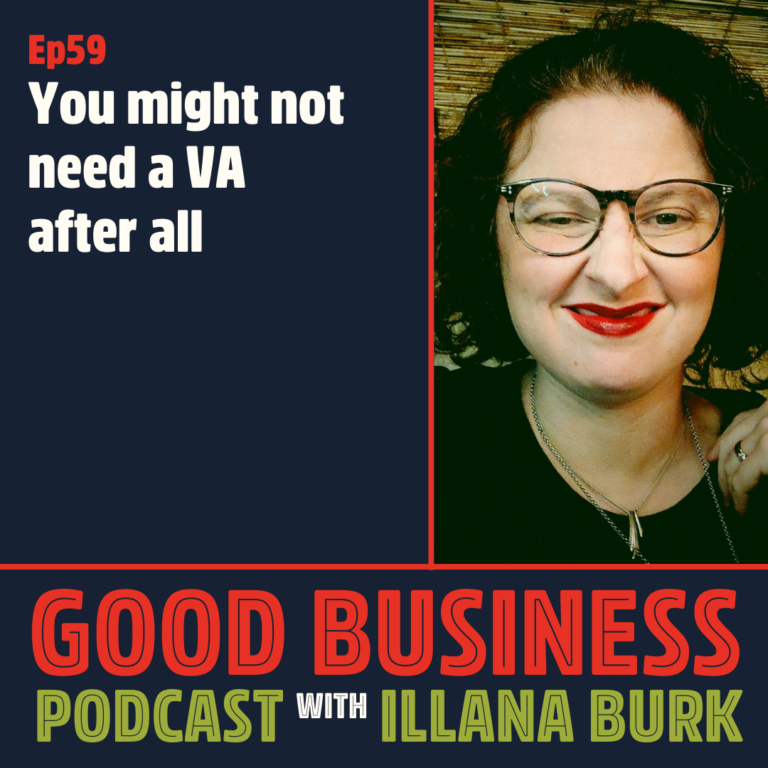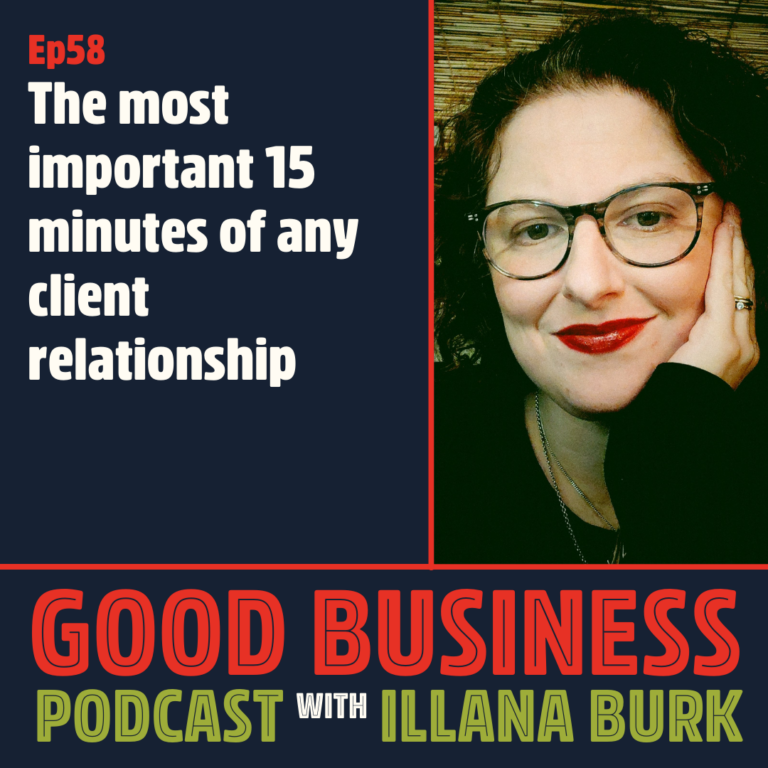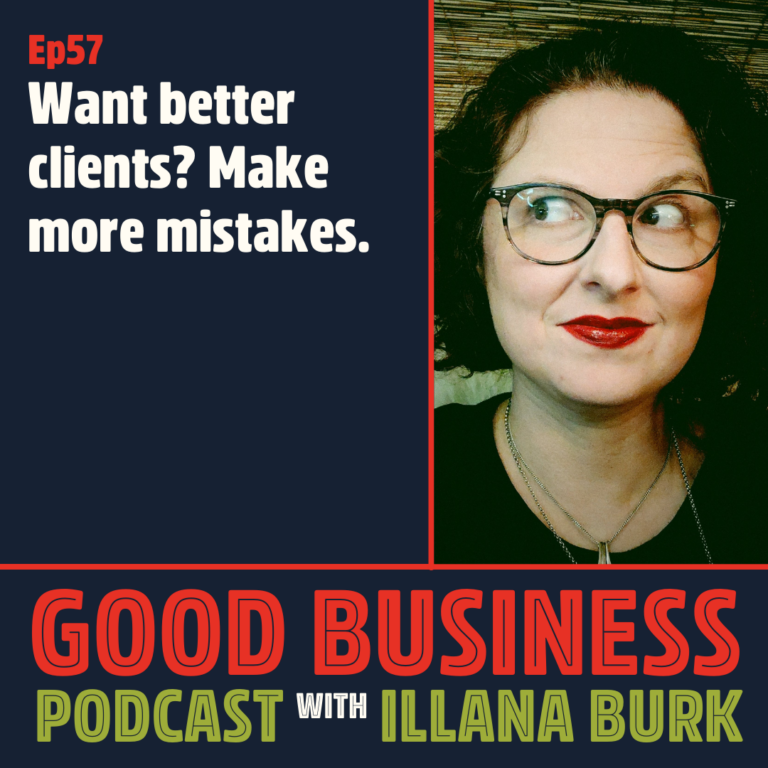Today’s episode is about being able to pivot.
Episode Transcript:
Hi everybody. And welcome back to The Good Business Podcast. I am your host, Illana Burk, and I am so delighted to have you here. Today, we are going to talk about something that comes up again and again, especially when you’re newer at business. But it really comes up kind of at every stage. And that is the willingness to pivot, to make big changes when you see them as necessary.
[00:01:03] Now a lot of this ties into the basic concept of objectivity. And we’re going to touch on that a little bit too. But today is really about making peace with something that we are told our whole lives, that we’re not supposed to make peace with, which is that something is not actually better than nothing. So.
[00:01:19] That’s what we’re talking about today. So I’m going to go a little bit into a story from a call that I had recently with, somebody in my community who was really, really struggling with the like fourth or fifth iteration of her website. And then we’re going to talk about a little bit of, kind of what I told her and what I would tell anybody in that situation. I’m also going to talk a little bit about my own experience in the early days of my business and pivoting and changing.
[00:01:45] And then we’re going to kind of put that into some context for why that’s so difficult for people and what you can do about it. So, first things first. This episode was really prompted by this call that I had with somebody in my community who was like, the poor thing is in her like fourth iteration of her website. She’s really, really struggling. She kind of followed all the like niching advice and made really clear design choices about her website and her brand. And she was DIYing everything. And
[00:02:15] she was making choices from a standpoint of like, how she wanted it to look and feel and making choices based on her own taste. And these are all kind of early boo-boos that a lot of people make, right. It’s pretty easy. You know, you start a new business and you’re like, I want my website to be the prettiest thing in the world and I want it to represent me. And I want it to be exactly how I see the inside of my soul, because I don’t want to be told what to do.
[00:02:38] This is really, really common stuff. The result of that though is often a really ineffective brand or really ineffective offer because you’re not paying attention to the right thing. You’re paying attention to what you want, not what your people want or need. What that translates into when you discover this because nothing sells and it doesn’t work is that you have to make a change. Well, that change comes with grief.
[00:03:02] Woof, does it come with grief? It comes with pain because of all the sunk cost of all the time you spent. So then you waste even more time beating yourself up about the fact that you couldn’t see the future and didn’t know any better and should have been able to know something that you didn’t know and couldn’t possibly know because nobody explained it to you.
[00:03:20] And all of the conventional wisdom was nichey, nichey, nichey, nichey. So you think you’re doing that, but you’re actually not doing that. You’re actually not effectively marketing. You’re actually not effectively targeting. You’re simply just putting out something that you like. This all ties to those like early lessons of when most people start a business and you ask them to do, you know, classic target marketing exercises. It looks a whole lot, like they’re describing themselves three, five
[00:03:43] fucking minutes ago. Right. So, because we all kind of start our businesses, especially as helpers, we start our businesses to help people like us because nobody was there to help us. This is very, very common. So, what that means though, is that. You open your website, you do your brand, you open your business, you do all the things. And you’re actually just trying to speak to yourself.
[00:04:05] But the thing is you are actually a little bit of a snowflake in this context. Everybody’s different. Their set of needs are different and your impact might have absolutely nothing to do with the… with helping somebody who’s just like you, which means that your brand is going to need to change, which means your offers are going to change. Which means how you are perceived will need to change because you’re not thinking sustainably, you’re thinking short-term because you’re just trying to get up and running and get something out there as fast as you can.
[00:04:30] These are extremely common states of affairs, right? Like this is so it happens to everybody, myself included by the way. My first year in business, I completely rebranded top to bottom soup to nuts four entire times. Because I basically built something, realized how it was being perceived and then realized I needed to tear it all down because it wasn’t targeting people that I wanted to target.
[00:04:53] Now I built my sense of objectivity the hard way. Which is how a lot of people do it. Unfortunately, what a lot of people also do is they do one version. It doesn’t work. They bang their head against the wall for a year or so. And then go, well, fuck it. This didn’t work at all. I’m going to just throw in the towel because they don’t realize that pivoting is even an option.
[00:05:12] And the thought of tearing it all down and starting over is so overwhelming and hard, and you feel like you just can’t do it because of all the reasons, right? Not the least of which being the stakeholders and the people in your life who were like, Wait, really, you just finished your website, you’re going to start all over again. And then you have to deal with all the, like the shame and the disappointment and all of that stuff too. And actually what you’re doing by pivoting, that’s your first step into real business ownership. And that’s,
[00:05:42] that’s our starting line today. That’s what we’re really talking about is the fact that the willingness and ability to tear shit down and build it back up better is absolutely the most CEO thing that you can do. It really is. Because CEOs understand this stuff. Experienced business owners, experienced business leaders understand that constant pivot and reinvention is not only encouraged but necessary.
[00:06:08] If market conditions change, if the needs of the people you want to help change, if you discover that you are bad at something within your business, and you are better at something you didn’t know about, you’re going to need to make a change. So this is all to say. Through a very nurturing, call with a lot of hugs and a lot of understanding and empathy,
[00:06:31] with my poor community member, we had a really great conversation about what she was doing, right, and what the longevity of what she created was really about and what it could be. And the fact that like, there is no lost cost, you know. There’s no loss time when you have to rebrand or reinvent or reimagine.
[00:06:51] Because you learn something, which means the next thing is going to be better. That’s the only way that anything ever gets better is by tearing something down and being willing to build something up that’s even better in its place, that’s more well-honed, that helps people better. That changes and shifts and grows with you, right? Otherwise,
[00:07:12] things just stay static and you never really learn anything. If you don’t learn anything you can’t lead because leaders learn. Business owners learn. You have to have a willingness to go, Well, shit that didn’t work. And you dust yourself off. And you stand back up and you see. Start all over again. This is, this is entrepreneurship. If you haven’t wrapped your head around that yet,
[00:07:35] this is your moment. Okay.
[00:07:37] This is it.
[00:07:39] If this is the first time anybody has said, be willing to tear it all down and start over. Be willing to take a long time. Be willing to recognize that you might have to work a crappy job on the side for a little longer than you might’ve hoped in order to build something that’s actually sustainable.
[00:07:54] Well, this is the moment when you get to hear that for the first time. Really sorry about that. Hate to be the bearer of bad news. But, pivot will always be necessary and reinvention will always be the thing that fuels you.
[00:08:08] So now I want to tell another story. I had a conversation recently with another community member, who’s somebody who I work with kind of outside of the community as well. And I also mentor this person in their own business, but they have skills that I don’t have. So I am always learning from them too.
[00:08:25] So we have a very symbiotic relationship. Now this person decided to take some stuff that they’ve learned from me. And taught it to their mastermind. Now, this is not going into the place of like, I felt all mad cause they were stealing or something. That’s not what I’m saying. It’s more like they took this concept and went, Hey, I think my people would benefit from this. This is something I encourage by the way.
[00:08:49] Never be shy about that. I always appreciate credit. Don’t be shy about it, sharing the things you learned from me, that’s literally how things improved. So that’s where I’m going with this. This person took my concept that I’ve been teaching for 10 fucking years, and showed me how they taught it and oh my God, it was so much better.
[00:09:10] It was so much better than how I was teaching it. And they pointed out some really cool brain science reasons that had not occurred to me of like why the thing that I was teaching could have been taught and more impactful, in a very subtle, different way. So, this person and I are now going to be running a workshop, co-teaching it. Because, oh my God, it was so much better. So I have a total willingness and openness to make my work better, which is as far as I’m concerned,
[00:09:35] critical. This is all the same conversation, a willingness to rework, a willingness to improve, a willingness to keep your eyes open for somebody making really valid points. Now, that’s not to say that you should always do what other people tell you to do. If they’re like, Hey, you know what you ought to do.
[00:09:54] Anything that starts with that sentence is I automatically am. Like, you should fuck all the way off, is what you should do. But you’re not me. I’m a little hard line about that particular thing, but. You have to learn discernment. You know, you gotta be discerning about like, okay, is this person considering my goals? Is this person considering my capacity? Is this person considering my best interest?
[00:10:18] And are they approaching me with a willingness and an openness to put my best interest and the best interest of the people that I serve ahead of the sound of their own voice and how much they enjoy it. So you gotta be willing to know who to listen to and who not to. And when. And you gotta be willing to then make adjustments accordingly. Discernment is everything. Being willing to take feedback can also be a cop-out.
[00:10:45] Being willing to pivot can be a cop-out. And that’s where the dark side is of this particular lesson. Yes, pivoting. Good. Reinvention. Good. Using that as an excuse to knock it off the ground. Bad. Oh, This is where objectivity is actually the bigger lesson at play here. Objectivity. Discernment. You have to know how to make a good decision. If you’re confused about how to make a good decision, you should come join my community and get a copy of Get to the Good Stuff so you can learn how to make discerning, objective good decisions.
[00:11:20] This is the component that I was talking about with this other person was a component of that. That’s taught in there about how to find your stakeholders. And it’s something that I have been teaching for a decade. If you find yourself staring at your work and going, why isn’t it working? Why does no one care? I don’t understand what I’m doing and I don’t understand what I’m doing wrong–
[00:11:39] This is the thing to go do. It’s painful. It takes a million years. Everyone hates doing it. I make you look stuff up in the dictionary. It totally sucks, but it’s also a super great learning tool. That’s going to help you build the backbone of the most important skill you can have as a business owner, which is.
[00:11:55] Objective discernment. How do other people see you and why do they make buying decisions on your stuff? How can you help that along? How are you detracting from it? How are you shooting yourself in the foot? Do you know the answers to those questions? Because if you don’t, you should totally come and sign up and hang out with me a little bit more because that’s my special sauce.
[00:12:16] So pivoting.
[00:12:19] What you can do about it? Well, obviously joining was the thing, you know, look at my big call to action. There’s my big pitch. Come join the community where we teach you how to make good decisions. This is something that will also forever be hard. Like it just is, it’s hard to look at something you’ve done because it feels like a baby, you know, it feels like something you created. It’s your beautiful, amazing thing.
[00:12:41] You really want people to buy it. You really want people to love it now. That doesn’t automatically translate to people actually doing any of those things. So you gotta be willing to go, well, that sucks and that stings and I’m going to do it anyway because it’s, if you actually care more about helping people than you do about.
[00:13:01] Your work being your happy Blessy place, even if it’s just 1% more. If you say that you’re in it to help people and you mean it like really mean it in your bones, this is why you’re doing this. Not because you want to make money. Not because you want to have freedom. You can have those things too, by the way, you just have to like, actually be willing to want to help people, like at least 1% more
[00:13:22] than those other things. I want all of those things too. I also am more focused on helping people than I am on those other two things. Which means. I occasionally make sacrifices in the money department, or I occasionally make sacrifices in the freedom department because helping people is extremely important to me.
[00:13:41] Now those sacrifices are done in clean and compartmentalized ways that don’t overly tax my ability to function, right. Or my ability to live a full life and have a well-balanced family life. But it does mean that I’m willing to push the edges a little bit sometimes. And I know where to stop. It also means that I’m willing to tear it all down.
[00:14:03] On a moment’s notice, if I can see that what I’ve created is not the right thing for the people I’ve created it for. So for an example of that, those of you who’ve been hanging out in my orbit for a while remember when my business name was Makeness Media. Makeness Media was one of those things that needed to pivot for like five years longer
[00:14:22] than it took me to actually do it because I was about to rebrand and then I made a baby instead, and that was my baby. So it took a lot longer than I had planned before I rebranded away. Because Makeness Media was hard to say, it was hard to remember. It never really was a deliberate brand, but it worked for what it needed to be for as long as it needed to be that way.
[00:14:42] So then I was rebranding. I created an entirely new brand top to bottom. Edge to edge soup to nuts. I think I said soup to nuts twice in this episode. Look at me go.
[00:14:53] Everything. Down to redoing every blog and shareable graphic for like years of content, it was a beast of a project and the brand was gorgeous. And the night before I was set to hit play and do all of the changeover stuff. I woke up in the middle of the night and went, Well shit. The whole reason for the rebrand was because the work that I do is far more personal
[00:15:19] than my brand gave space for. It brought way more of our lives into the conversation. And the brand I had created was cold and indifferent. It was very cool and very businessy and very like hipster chic of white backgrounds and slab serifs and cool design stuff that would’ve probably been super neat. But it didn’t have me in it.
[00:15:46] And it definitely didn’t have my people as actual people in it. It spoke to everyone as business owners and not as fully functioning well-rounded human beings who were doing really deep work in the world. And that was the place I wanted to move. What I realized was my overhaul and re-invention was actually just a re-imagining of what I already had and was trying to get away from.
[00:16:13] So I set it aside and I started over and Your Life’s Workshop was born. And it is extremely well aligned and connects with people deeply, and is the thing that my people needed in order to get what they wanted most from me, which is a well-rounded life with their work at the center. So now I get to teach people how to find and create their life’s work. And I get to do that every single day. And I get to talk about things from every angle that I want to talk about.
[00:16:41] And that has afforded me the very same freedoms and financial return that I want as well. But it mostly allows me to help people and meet them where they are.
[00:16:53] So be willing to change, man. It makes things better. And if you’re not sure if a change is needed. Join the community. And I’ll tell you.
[00:17:06] If you’re looking for a shortcut because you haven’t found your way to discernment yet, outsource it to somebody who can help. That’s somebody is me, literally my whole thing. Okay. If you’re looking for a supportive group of people who can help you along the way and have your best interest at heart and pay attention to the nuances of
[00:17:30] your goals and what you’re trying to accomplish and not just give you advice based on what worked for them– because chances are, that’s not going to be the thing that works for you– then you should totally join the community, man. It’s going to be rad and it is, well, it already is rad. We have great weekly calls. We have lots of live coaching. We give each other incredible feedback and it’s a space full of everybody from bestselling writers to brand new consultants who are just getting off the ground. Everybody plays nice and everybody helps each other. It’s pretty magical and you should totally join. So.
[00:18:03] There’s my big sales pitch. And, to just recap, Pivot, but only if you know what you’re doing. If you don’t know what you’re doing, go learn. Because learning discernment and learning what you stand for learning what’s on brand and off to use the jargon, is everything and it will help you so much in the long run. And, don’t be shy about putting in the work. Okay.
[00:18:24] This is hard stuff and nobody went to school for this. Well, unless you did, unless you went to fancy business school like I did, but most people don’t, right. Most people start businesses. And they don’t know what they’re doing and they think they should know. And you shouldn’t know. There’s a lot of skill involved here. There’s a lot of things to learn. You’re not a designer. You’re not, unless you are. I mean, but you get the idea.
[00:18:45] You’re not an accountant either. You’re not a lawyer. You’re not a copywriter. You’re not a website developer. All of these things are things we try, we have to pretend that we know how to do when we’re just getting up and running if you don’t have money to throw in everything.
[00:19:02] That means that you’re going to make a lot of fucking mistakes. Be willing to let it be okay. And look for the resources that you need to know. When you’re way out of your depth. And when that, that being out of your depth is actually the very thing that’s preventing you from moving forward and gaining the successes that you most want. So.
[00:19:22] Alright, everybody, have a really wonderful summer. I hope everybody is staying safe out there. And I look forward to seeing you in the next episode. Bye.
Thanks so much for hanging out with me today. For more information, visit thegoodbusiness.co or yourlifesworkshop.com.
More Episodes
How to deal with business pauses | GB62
In the fast-paced world of entrepreneurship, taking a break can often feel like a foreign concept. The constant pressure to grow, scale, and make a bigger impact can make prioritizing personal well-being and life outside of work...
The problem with most excellent plans | GB61
Ever plan an amazing business move but hit a roadblock? This episode tackles the "pothole" of poor planning for solopreneurs. Learn how to "right-size" your strategy based on your resources and set yourself up for sustainable...
When to stick and when to bail | GB60
Feeling stuck in a business project that’s not taking off? This episode’s for you! We explore the often-overlooked skill of quitting and guide you through 4 key questions to help you decide when to persevere or let go. Learn to identify your true motivations, navigate self-doubt, and make choices that align with your goals and well-being. Listen to discover when to stick and when to bail!
You might not need a VA after all | GB59
Overwhelmed business owner? Stop! Hiring a VA might not be the answer. Learn how to ID expert vs. VA tasks & hire the right person for the job (without becoming a “shitty boss”). Listen in and get bonus tips in the show notes!
The most important 15 minutes of any client relationship | GB58
In this episode of the Good Business Podcast, we dive into the critical 15 minutes that can make or break a client relationship. Want to know why these first few minutes are so crucial, what should be included, and how to adjust...
Want better clients? Make more mistakes. | GB57
Today’s topic is mistakes in business. Why? We all make them. Good business involves managing both good and bad situations effectively, with elegance, education, confidence. This skill is often overlooked. Let’s explore common...
